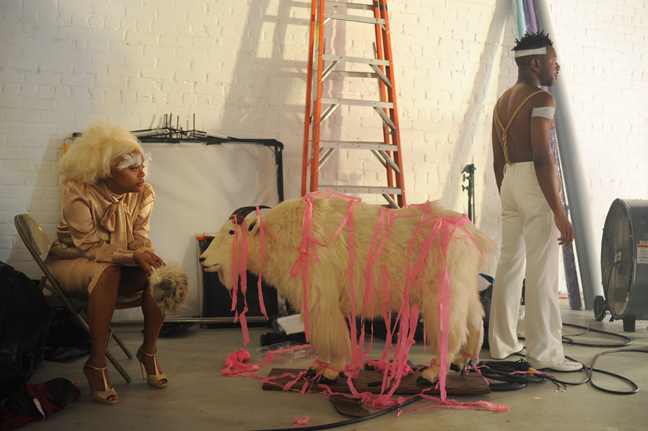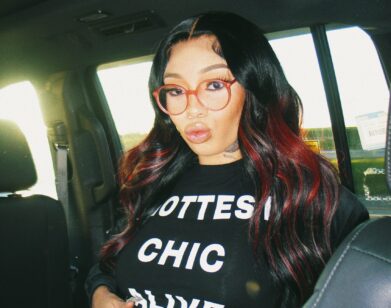Discovery: JOGYO

JOGYO: DEVI MAMBOUKA (LEFT) AND DRU BARNES. PHOTO COURTESY OF CHARLIE GROSS
The ambitious musical project JOGYO brings together Dru Barnes’s and Devi Mambouka’s musical and artistic influences from cultures all around the world. Combining tribal and folkloric elements, the duo has put together songs that are performance art pieces. Taking in influences from Africa and Jamaica, JOGYO relies heavily on storytelling from different cultures.
With influences from Marina Abramovic, Terry Lynn, Florence and the Machine, and Fever Ray, JOGYO has created a musical mixture of art-rock and hip-hop. Barnes and Mambouka are trying to unify the masses with their musical interpretations. Their take on a new movement in African culture has allowed the duo to look around the world for trans-African culture and its translation into music. With two singles out on iTunes right now, JOGYO spoke to us about “Nuvo-frique,” the evolution of hip-hop, and “rudeboys.”
MEETING IN THE NIGHT: [Mambouka:] Well, I’ve been deejay for the past seven years. So doing nightlife, we met like that at parties.
ON MIXING CULTURES AND MAKING MUSIC: [Barnes:] I started out working as a conceptual artist. It was kind of inspired from an idea that we saw influences of Africa globally. I was doing a kind of study and a friend of mine was in Tokyo, I was doing a study on African culture in Japan and how it influenced people and reggae culture. It led to us looking at trans-African culture around the world and how that translated into the music, into the fashion and entire vibe of the country. We found that every country we looked at, there was a very distinct influence from whether it be hip-hop culture or African culture in general. So, it’s kind of a conceptual idea behind the project. As we got together, we developed the concept to kind of name what this whole thing is. We called it “Nuvo-frique,” which is “New Africa” in English. Nuvo-frique is a new movement in African culture. It is kind of incorporating everyone as people in this New African idea.
[Mambouka:] I’m from Gabon, Africa. It’s the central-west coast of Africa. It kind of related back to the concept we had for JOGYO: it was perfect that I had an African background and also I had an Asian background. I had a lot to add to the project and brought life to it, because of my experiences growing up in those countries, in Gabon, the life there, the dances, the music and everything.
THE MEANING BEHIND JOGYO: [Barnes:] JOGYO is a Buddhist Bodhisattva. A Bodhisattva is a person who upon attaining enlightenment decides to help others also receive and be able to attain this. In essence, the word itself means “pure or un-swayed or unchanged consciousness.” That’s really what it means. It’s a Sanskrit word: an ancient, Buddhist Sanskrit word.

ON GLOBAL INFLUENCES: [Mambouka:] I’m a performance artist. I studied butoh, which is a form of Japanese dance. The forefather of butoh is Kazuo Ohno. I do a lot of that, as far as on stage that I bring forth to our performances. Some of my other creative inspirations are Marina Abramovic and Maya Deren. I’m from a pygmy tribe, so a lot of folklore and dancing. Some of the western influence, Diana Ross and currently Florence and the Machine. Fever Ray is a big inspiration for me.
ON STAGE PERFORMANCES: [Barnes:] One of our first shows was N’Dea Davenport from The Brand New Heavies. They’re an amazing nineties band. They started trip-hop, so we performed with N’Dea Davenport.
ON PUTTING ON QUITE THE SHOW: [Barnes:] Well, we’re really open right now. We definitely would like to perform with people that are pushing the boundaries creatively on stage. A lot of our live shows, it’s really about performance art. So, we like the idea of performing with people that are really into giving a full experience on stage with music, apart from just playing a song. We’re really putting on a show.
GROWING UP WITH RUDEBOY: [Barnes:] “Rudeboy” started out as a concept in my head. It’s a true story when I was little growing up in Kingston, Jamaica. There was a point where there was huge rift in the country between the different politicians. Vigilantes would go around and they would really scare the people in Jamaica. They were called “rudeboy.” The whole idea behind the song is about acknowledging what happened. They would come around with guns and machetes and really wreak havoc in the homes they would go into in order to get a political idea across. When I was little, I was about three years old; I remember lying down in the house with gunshots going through the window. We knew these people that were coming were called “rudeboy.” The song itself is going back into this to talk about reformation in the country, reformation of the mind and also about reformation about how the male mentality in the country is about dominance and such. The idea of the song is about putting down the gun and really picking up education and picking up the idea of bettering yourself through music or otherwise. That was a direct experience for me and my family growing up in Jamaica during the time period where that was happening.
ON SONGWRITING AND STORIES: [Mambouka:] We have a lot of songs that we already recorded, and we actually perform when we have a show. We came out with the singles. We have two singles that are out right now on iTunes: “Rudeboy” and “Thundacat.” There’s an album coming out next year. Each one of our songs has different stories. Not only focused on the worldview or the past. We just have fun with the music. When we do the music, the story that comes out is more of who we are and how we view our lives. It’s not specific to one cause. It’s inspired from our environment.
[Barnes:] The thing I really want to point out with us in a nutshell is “sans histoire.” It is in French and means “without our history.” It really symbolizes the idea of letting go of the attachment from your cultural identity and going to a place where we’re all equal. It’s about really unifying.
FOR MORE ON JOGYO, VISIT THEIR FACEBOOK.






